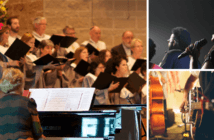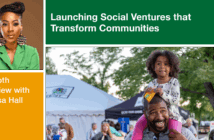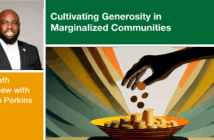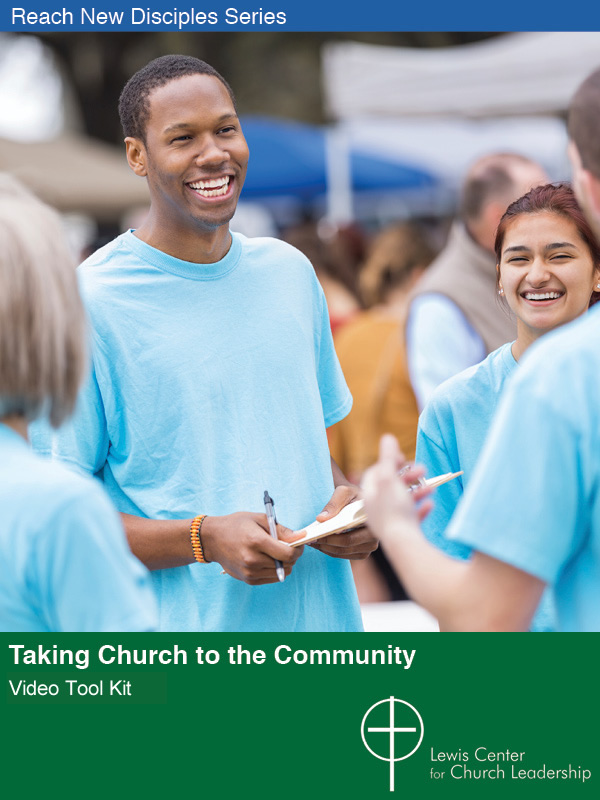What are the unique characteristics of young people coming of age today? Rock Jones, president of Ohio Wesleyan University, describes a generation of digital natives who are highly connected but also lonely and anxious. Dr. Jones describes Gen Zers’ life questions, the perspectives they bring to spiritual engagement, and ways church leaders can meet them where they are.
Listen to this interview or continue reading.
Doug Powe: In your position as a president, you get a bird’s eye view on the lives and priorities of young adults. What do you observe about their spiritual needs and opportunities for forming them for a life of faith?
Rock Jones: Well, that’s a great question, Doug. And I thought, with your permission, I would begin by just providing some background information on what sociologists and others who study generations within our society have learned about Gen Z or Generation Z. This is the generation that follows the Millennials, who were born between 1995 and 2009. So today’s traditional college-age students, ages 18 to 22, fall right in the middle of Generation Z. But the things that we know about Generation Z also apply to individuals up to about the age of 25. So individuals and local churches puzzled about how to reach the youngest adults in their population might find this information of use, as well.
People who are part of Generation Z grew up in a Post-9/11 world. So they’ve always known our country to be at war and fighting terrorism. Just think about that and how that might impact a generation.
And I think it helps us think about the role of campus ministry at this moment in time. People who are part of Generation Z grew up in a Post-9/11 world. So they’ve always known our country to be at war and fighting terrorism. Just think about how that might impact a generation. They lived through a recession early in their lives. They’re likely to be social entrepreneurs. They want to make a difference. This is a generation that lives with its passion, leads with its passion. And I find within our students there’s a real sense of creativity and innovation and entrepreneurial spirit. They know that they will not go to work for a big company like IBM and spend 40 years there and retire from the company where they go to work when they graduate. And many of them know that they will need to form their own organizations as our society and culture continue to change. So they’re entrepreneurial and they’re more interested in social entrepreneurship. They’ve learned in classrooms that are focused on inclusion. And so they care deeply about diversity and inclusion. But that focus on inclusion also makes them collaborative team players. And so this is a generation of people who like to work with others. They don’t want to be siloed. They don’t want to be on their own. They don’t want to be individualized.
Because of technology and social media, their social circles are global. Their world is smaller and they care more about the planet. So this is the generation of digital natives. They don’t remember life without an iPhone. They don’t remember a life without being deeply connected. And so they have relationships with people they have never been physically present with, and those people can be anywhere on the planet. And as a result, this is a generation that cares deeply about the planet. Whether or not climate change is real or not a controversial topic among this generation. They believe it. They know it’s going to affect their lives and they care about it.
Some demographic information about the generation. Seventy-five percent of this generation identify as either first to go to college — as either first generation, the first in their families to go to college — low income, or a racial minority. So that’s quite different from the college populations when I was in school in the late 70s. Half of this generation have felt an overwhelming anxiety that has challenged them academically at some point in their lives. A third of them have a diagnosed mental health condition. So this is a generation, while deep connected, also feels anxiety. And with that anxiety, they can feel alienation, paradoxically. They report levels of loneliness higher than any other generation. Again, that paradox of being deeply connected and yet lonely and anxious. Thirty-six percent of the people in Generation Z have considered suicide. Those data come from UCLA’s Higher Education Research Institute, 2008 SERP survey. This is a survey that’s been administered with first-year college students for more than 40 years. And it allows us to see how college students have changed over the decades and through the generations.

Some other things that have been found about this generation, they’re closer to their parents than previous generations. They often talk to their parents every day. When I was in college, we called home on Sunday night for 10 minutes because the rates were cheaper on Sunday. And it was a very expensive thing to do. This generation remains closer to their parents. They crave stability and they have a heightened awareness of safety. Again, a generation that has never known life without this country at war and that grew up after 9/11.
Some other things that are interesting to me about the generation, it’s a compassionate generation. They care about other people. It’s an optimistic generation. Seventy-nine percent feel that when faced with challenges, they have the power to change their situation for the better. That’s remarkable for a generation of 18 to 22 year-olds. But it’s also a stressed out generation. The American Psychological Association has found that 91 percent of the Gen Z population has felt either physical or emotional symptoms associated with stress. So this helps us realize that this is a different generation.
It’s a generation that is by virtue of technology, both deeply connected and yet by the virtue of the time in which it has grown up, sometimes deeply alienated and anxious. It’s a generation that is driven by passion. It’s a generation that feels a deep moral responsibility to make the world a better place. And I think all of those feed into how we think about cultivating spiritual life and cultivating opportunities for students to grow and develop in that dimension of their lives.
Small colleges like Ohio Wesleyan and Hendrix College, the college I attended and where I worked before coming to Ohio Wesleyan, understand that their mission is to cultivate the whole person, to develop the intellectual curiosity, to develop the abilities of students to interact with others socially, to be competent in the work they do, to be engaged citizens. But a part of what it means to be a whole person is to tend to the spiritual dimension of life. And so I think as we think about what it means to do this work here in 2021 and the years just ahead, we need to think of the framework of what we know about this generation of students.
It’s a compassionate generation. They care about other people. It’s an optimistic generation.
Doug Powe: Rock, that was extremely helpful. And I appreciated the statistics that you shared. I’m curious about a couple of things. One is this tension between social entrepreneurship, but at the same time, this feeling of anxiety and loneliness in terms of, you know, on the one hand wanting to go out, be creative and do their own thing. But on the other hand, it seems like there’s anxiety about going out and taking a risk to do their own thing. So as you think about the role of campus ministry, how does it speak to that tension to students?
Rock Jones: Yeah, that’s a great question, Doug. And I think that is precisely the lane in which campus ministry should find itself — helping students understand their sense of meaning, their sense of purpose and vocation. Vocational discernment, I think, is at the core of campus ministry today. And when vocational discernment is done well, I believe it can help students overcome that anxiety to find their true sense of purpose, to live into their passion and to find a life that is rich and full and that makes a difference in the world. And these are the things that we know this generation wants to do, giving them the tools with which to do it and the sense of well-being with which to do it are so important. I think it’s interesting that on many campuses today, religious life centers, chaplaincies — the terms vary — are partnering much more closely with career centers because of the role of vocation in understanding the meaning and purpose of life, and in the way in which we can help students navigate toward a life that will bring them fulfillment and that will allow them to make a difference in the world. So that’s a really good question and an important point.
Doug Powe: Let me continue in that line. What are the big questions you hear them asking? They may be asking you directly or you just may overhear them talking to others. But what are the big life questions that connect to faith that you hear students asking that you some of our listeners, particularly those who are in congregations, may not be as aware of?
Rock Jones: Doug, let me flip the question a bit and offer questions that I present to students and that now are framing conversations among students on campus. These are questions that for the last three or four years I’ve shared with high school students when they visit campus. I have suggested that, you know, if they would think about these questions, then we can talk about what their experience at Ohio Wesleyan might be like and what it might mean for them. The first question I ask students is, “What do you care about ? What are your passions? What gets you up in the morning? What’s on your mind as you go through the day, as you come to the end of the day and go to bed at night? What are you thinking about? What do you care about?” And I find that these are questions that students are asking. But when we’re able to help them frame them together, it provides some synergy and I think can be meaningful for them.
The second question I ask is, “Where do you want to go?“ And I ask it literally. “You could go anywhere in the world to think about the questions that you care about, where would you go?” What do you care about? Where do you want to go? But then I also ask that second question more metaphorically, in terms of life journey. “Where do you want to go in your life?”
And the third question that I ask, and this is the vocational question, and I think that at the core, this is the question that’s on the mind of every student. I say to them that I don’t expect that they’re able to answer it at the age of 17 or 18, but hopefully over the course of their college experience, we can help them answer it. It’s the question, “Who do you want to be?” And embedded in that question are questions of passion, of the vocation, of direction. “What kind of impact do you want to make on the world? What kind of difference do you want your life to make? Where do you want to live your vocation? How does your vocation intersect with avocations? How does personal intersect with professional? Who do you want to be?”

And I find that those three questions, “What do you care about? Where do you want to go? And, who do you want to be?” lead to deep and meaningful conversation. And I’ve been asking the questions long enough now, that this year for the first time when I meet with graduating seniors, as I do in the spring each year with groups of eight to 10 students at a time, I’ll be coming back to those questions and reminding them that we talked about those questions when they arrived and asking them how their answers to those questions have evolved over the four years of their time here. You know, there’s probably no four-year period of greater maturation than the four years of the traditional undergraduate college experience. And so I think these questions give us an opportunity to explore that. And these become then the big questions that we hear students at Ohio Wesleyan asking.
Doug Powe: Let me stay in that vein for a second. And I think that framing is interesting. Because I believe — I don’t want to tell my age — but as far back as when I was at Ohio Wesleyan, I also probably was thinking about those same questions, even if I hadn’t framed them that way as you mentioned, as a 17 year-old. But those were really the questions that I was seeking to answer. So building on that, my question then is, how can congregations who are always interested in connecting with college students really think about engaging those questions? Because it seems to me the disconnect in some ways between congregations — talk about college students, but young adults in general — is that congregations are asking the wrong questions and trying to help them answer the wrong questions. So how can they think about these questions as it relates to the work of a faith journey?
Rock Jones: That’s a great question. And I want to come back just a bit to the way that work happens on campus today and then extrapolate to congregations a couple of things that I’ve not said that I think are important to note. One, at least on our campus, students today are very interested in interfaith conversation. And the work of Eboo Patel has become very important in American higher education. And we have a very diverse student body. We have a large Muslim population through our international student recruitment. We have a significant Jewish population. We have a Roman Catholic population. We have the various branches of Protestantism, including an evangelical presence on campus. And we have smaller numbers of other religious traditions. If students arrive with faith formation in their background, they’re probably more interested in learning from students, fellow students of other traditions, and then thinking about how that background informs their own faith experience.
We’re now at a point where the majority of students applying to college in the country, when they’re asked to list the religious affiliation, which is an optional question on applications for admission and on surveys. It cannot be required. But the majority of students applying to college now who answer the question, answer “no affiliation.” So the majority of students coming to college have not been nurtured in a faith tradition prior to coming to college. So I think it’s important for congregations to understand, 1) students are interested in interfaith exploration, 2) the majority of them have not experienced faith formation, 3) to the extent that they think about faith or they think about spirituality, they tend to want to think about how it connects to the way they enact their passions, the work they will do to make the world a better place. And so all of that, I think, rolls up into helping congregations think about how to work with college age students or other young adults.
They tend to be suspicious of institutions. So they’re probably not as likely to put up their hand and say, I’m going to be in worship every Sunday morning. But they care deeply about these questions, which I believe are vocational in nature and connect to the life well-lived that includes a spiritual dimension. So I think if congregations can find spaces where students can engage these questions and take these questions and put them to work, that will be beneficial. Eboo Patel talks about the triangle of religious expression, service to the world, and diversity. And this generation values all of those. And so, if a congregation reaches out to them and says “We’d like for you to worship with us, and we’ll do a service project” but is not ready to talk about diversity, it’s going to have more difficulty with this generation. If it wants to talk about diversity and worship without having a way to put faith to work, they’ll have difficulty with this generation. This generation is suspicious of institutions. And it occurs to me that we Methodists are well positioned in the heritage of the Wesleyan class meeting to have a modality that I think would be meaningful to this generation — small groups in personal, intimate relationships, sharing the faith and doing good work. Perhaps congregations can think about how we go back to our Wesleyan roots as a way to reach this generation.
There are things that are deeply polarizing for older generations that are not so polarizing for this generation. And one of those issues is of the LGBTQ-plus community. This is an inclusive generation. And this is a challenge for the portion of the church that continues to resist full inclusion for that community.
Doug Powe: I’m interested in the last thing you just said. So in thinking about the small groups … Because, of course, if you go back to the founding of the Methodist movement, it was started at a university, basically in a small group setting. So do you picture this as congregations empowering leaders on campus to bring together fellow students to live this out? So what would be your picture of how you would see this modality taking place?
Rock Jones: I think that’s an interesting way to think about it, Doug. And I think it requires some congregational and denominational humility. You know, it pains me to have to acknowledge that the denomination that formed me does not reach this generation in the way that it reached my generation. And so I think those of us who care about congregational life and care about, in my particular instance, United Methodist congregational life, need to acknowledge with humility that we must think differently and we must be willing to interact differently. In some ways, that’s what Wesley encountered. The Church of England was not meeting the needs of the group, the band that he brought together in his methodical way. And he found a way to do that. And so I think there’s something in our DNA as Methodists, and I know we’re talking to a much larger group, but I think within other traditions there also could be within their DNA ways to reach this generation that feel institutional.
Doug Powe: You’ve already started down this path by talking about the small groups, but if we were able to say, Dr. Jones, we’re going to allow you to create a campus ministry at Ohio Wesleyan as our outreach person at whatever congregation it is. Given everything that you know now and have gained through your years of working at the university setting, what would be some of the first steps you would take to connect with college students?
 Rock Jones: I would look for ways to sit with students and listen to them. And let them help shape the work we would do and how we would do it together. This is a group that wants to be engaged. I would look for ways to do it, both in-person and using technology. The pandemic is an interesting thing to add to our discussion. When we were talking earlier about the various characteristics of this generation, I didn’t mention the ways in which the pandemic has accentuated the fact that they’re digitally fluent. So they’ve been able to do things more easily than some of the rest of us. But it also has contributed to the alienation and separation and anxiety because we’re all physically separated from one another. I think in the same way here, the pandemic gives us an opportunity to think about how do we really connect with this generation. They do most of their communication digitally and you can be in a room of students and they’re texting one another across the room. So I think we want to listen to them and we want to meet them where they are. And out of that, develop a process where vocational discernment and interfaith interaction probably become central.
Rock Jones: I would look for ways to sit with students and listen to them. And let them help shape the work we would do and how we would do it together. This is a group that wants to be engaged. I would look for ways to do it, both in-person and using technology. The pandemic is an interesting thing to add to our discussion. When we were talking earlier about the various characteristics of this generation, I didn’t mention the ways in which the pandemic has accentuated the fact that they’re digitally fluent. So they’ve been able to do things more easily than some of the rest of us. But it also has contributed to the alienation and separation and anxiety because we’re all physically separated from one another. I think in the same way here, the pandemic gives us an opportunity to think about how do we really connect with this generation. They do most of their communication digitally and you can be in a room of students and they’re texting one another across the room. So I think we want to listen to them and we want to meet them where they are. And out of that, develop a process where vocational discernment and interfaith interaction probably become central.
Doug Powe: That’s helpful. And I was thinking, as you were talking about students wanting to be together physically, but at the same time while together, still using technology, part of the challenge of the pandemic, of course, is you aren’t able to have the physical contact with one another. And I think, that’s an important fact that we miss. That although they are digital natives, they still like to be physically present with one another, even while they’re still using the technology. So it’s really a “both/and” not an “either/or” for them. And I think sometimes we think about it as an “either/or” solution. Do you think that’s a fair statement?
Rock Jones: Yeah, absolutely. I think it is a “both/and.” And one other thing I want to add, Doug, is that there are things that are deeply polarizing for older generations that are not so polarizing for this generation. And one of those issues is of the LGBTQ-plus community. This is an inclusive generation. And on our campus, the majority of our more conservative students are very inclusive on LGBTQ-plus matters. And this is a challenge for the portion of the church that continues to resist full inclusion for that community, it alienates a much larger section of this population than, say, of my generation.
This generation, largely across the political spectrum, believes climate change is real because they’re the ones who will live with the consequences. And for those who are spiritually oriented, religiously inclined, faith formed, this is a fundamental moral, and spiritual issue.
Doug Powe: Rock, we’re getting close to time, so we will end here. But based on your last comment, I find that interesting. The theme is that this generation can live with contradictions in the ways that we may not have been able to do so when we were coming along. One, I’m wondering if that’s a fair statement? And two, if that is true, then what does that mean for congregations and having to rethink how they will do ministry?
Rock Jones: That’s an interesting way to put it. I hadn’t thought about it quite that way. I think the things that we find to be contradictions, this generation just does not. Climate change. You know, look at the political discourse around climate change and the climate change deniers. This generation, largely across the political spectrum, believes climate change is real because they’re the ones who will live with the consequences. And for those who are spiritually oriented, religiously inclined, faith-formed, this is a fundamental moral and spiritual issue. And not so much the case for some of the people of my generation. And so to your question, I think for congregations, it really is to have again, there’s a bit of humility here, to recognize that this generation has concerns and passion and cares that are quite different and more broadly shared than other generations. And they’re not likely to become engaged unless there’s some acknowledgement of those shared values.
Doug Powe: Well, Rock, thank you so much. This has, I believe, been extremely insightful. And I truly believe that this will help congregations to have dialogues, to think more deeply about how they connect with young adults. I appreciate your joining us today.
Rock Jones: Well, it’s a pleasure to be with you, Doug. Thank you for taking time to think about this important topic. And I look forward to hearing how congregations respond and to the work that they were doing in this area.
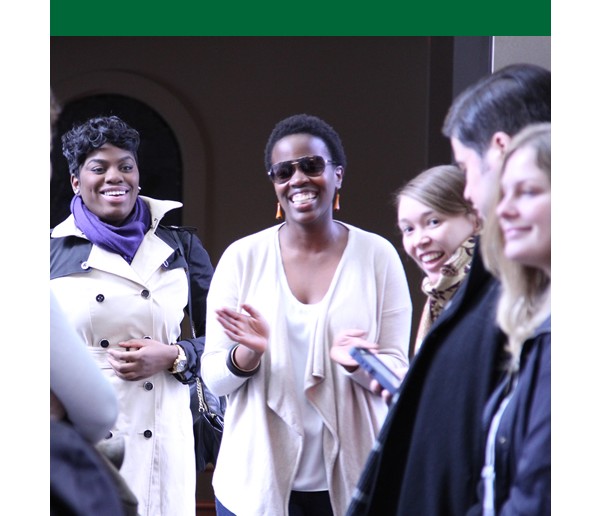 Related Resources
Related Resources
- “Understanding Generation Z and Connecting with Their Passions.” a Leading Ideas Talks podcast episode featuring Rock Jones
- Connecting with Young Adults through Online Ministry by Chris Wilterdink
- “The End of Youth Ministry,” a Leading Ideas Talks podcast episode featuring Andy Root
- Leading Ideas to Reach Young Adults, a Lewis Center e-book with introduction by Lovett H. Weems Jr.



